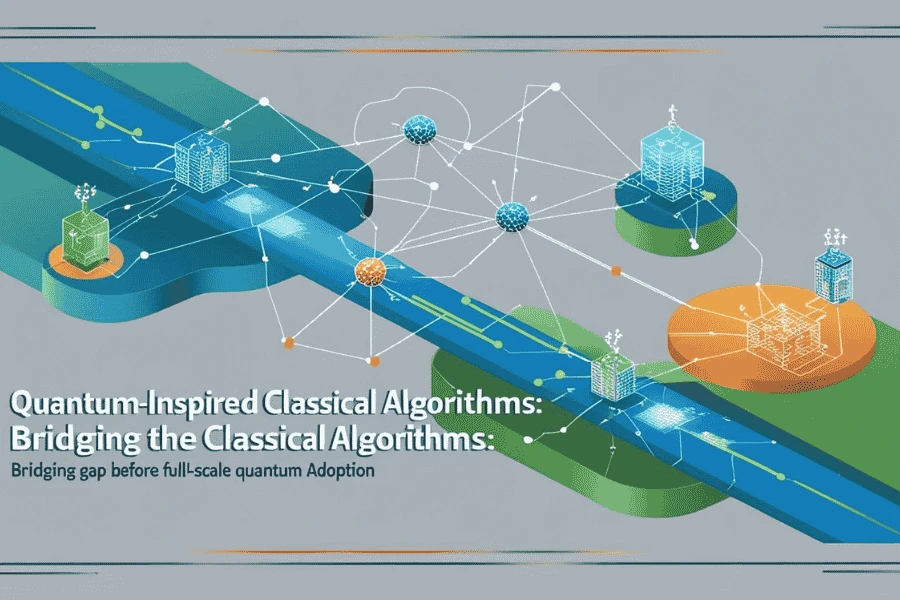Quantum-Inspired Classical Algorithms: Bridging the Gap Before Full-Scale Quantum Adoption
Introduction
While quantum computing continues to make progress, practical and scalable quantum hardware is still years away from mainstream adoption. In the meantime, quantum-inspired classical algorithms are emerging as a powerful alternative. These techniques, though executed on classical hardware, are influenced by core principles of quantum mechanics such as superposition, entanglement, and amplitude amplification. The result is a new class of algorithms that simulate quantum behaviors and often outperform traditional methods in tasks like optimization, machine learning, and financial modeling.

What Are Quantum-Inspired Classical Algorithms?
Quantum-inspired classical algorithms (QICAs) do not require actual quantum hardware to function. Instead, they use insights derived from quantum mechanics such as superposition, entanglement, quantum annealing, and amplitude amplification to craft novel classical approaches to computation. These techniques are particularly effective in handling complex optimization problems, high-dimensional data analysis, and simulation tasks.
For example, quantum-inspired optimization algorithms mimic the behavior of quantum annealers to solve combinatorial problems more efficiently than traditional classical heuristics. Tensor networks in machine learning, originating from quantum physics, have found new relevance in compressing and modeling large-scale datasets. Even quantum walk algorithms analogous to random walks in quantum mechanics are being repurposed for classical graph traversal and search.
Why Quantum-Inspired Techniques Matter Today
The growing relevance of quantum-inspired algorithms is tied to both necessity and opportunity. Since true fault-tolerant quantum computers remain a distant goal, businesses and researchers are looking for quantum-ready strategies they can implement today. These techniques allow teams to develop quantum computational thinking, benchmark their solutions, and prepare their systems for the future all while benefiting from performance improvements using existing infrastructure. Industries such as logistics and finance are already adopting these methods to solve problems that were previously computationally prohibitive.
Real-World Use Cases and Industry Applications
Finance:In the financial sector, quantum-inspired tensor networks are being used to optimize investment portfolios and model risk with greater precision. Tools like Azure Quantum pricing calculators now incorporate classical solvers based on quantum principles, enabling users to test advanced optimization strategies without specialized hardware.
Logistics:In logistics, companies are using route optimization models based on quantum annealing to reduce fuel costs and increase delivery efficiency. These models simulate quantum processes using classical algorithms, showing that even without quantum hardware, quantum principles can deliver significant gains.
Challenges and Limitations
Despite their advantages, quantum-inspired approaches are not without limitations. They are often domain-specific and may require significant computational power. Additionally, as real quantum systems improve and issues like quantum decoherence are resolved, true quantum algorithms could surpass their classical counterparts. However, at present, these techniques remain an essential stepping stone toward broader quantum adoption.
Conclusion
In conclusion, quantum-inspired classical algorithms are more than a temporary solution; they represent a transformative shift in how we approach computing. By adopting these methods today, organizations can solve real-world problems efficiently while preparing for the transition to full-scale quantum computing. Whether through simulated quantum annealing, tensor network optimization, or quantum machine learning tools, these innovations are redefining what’s possible with classical systems and paving the way for the future of computation.
Artificial Intelligence and Machine Learning
Quantum machine learning is another area seeing rapid growth. Researchers use low-rank matrix approximation algorithms, inspired by quantum linear algebra, to train deep learning models more efficiently. By understanding the trade-offs in quantum vs classical computing performance, teams can make smarter technology investments. For those starting out, exploring the best quantum computing courses can build a strong foundation.
Active Events
Best Tips to Create a Job-Ready Data Science Portfolio
Date: Aug 06, 2025 | 7:00 PM(IST)
7:00 PM(IST) - 8:10 PM(IST)
2811 people have registered
3 Must Have Projects On your CV to Get into Data Analysis
Date: Aug 05, 2025 | 7:00 PM(IST)
7:00 PM(IST) - 8:10 PM(IST)
2753 people have registered
Bootcamps
Data Science Bootcamp
- Duration:8 weeks
- Start Date:October 5, 2024
Full Stack Software Development Bootcamp
- Duration:8 weeks
- Start Date:October 5, 2024
